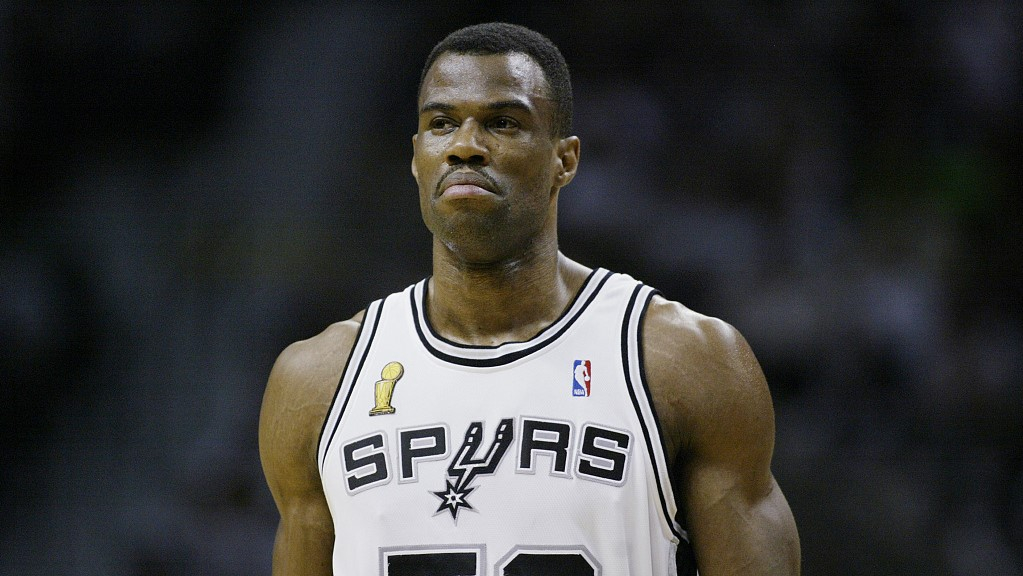
David Robinson, two-time NBA champion of the San Antonio Spurs. /VCG
David Robinson, two-time NBA champion of the San Antonio Spurs. /VCG
What's your first impression of David Robinson?
In China, many basketball fans call him, Patrick Ewing, Hakeem Olajuwon and Shaquille O'Neal "the Four Greatest Centers in the 1990s."
Fans of the San Antonio Spurs love Robinson because he made the team's transition of leadership from him to Tim Duncan smooth like butter, not to mention Robinson's contributions to the team's two championships in 1999 and 2003.
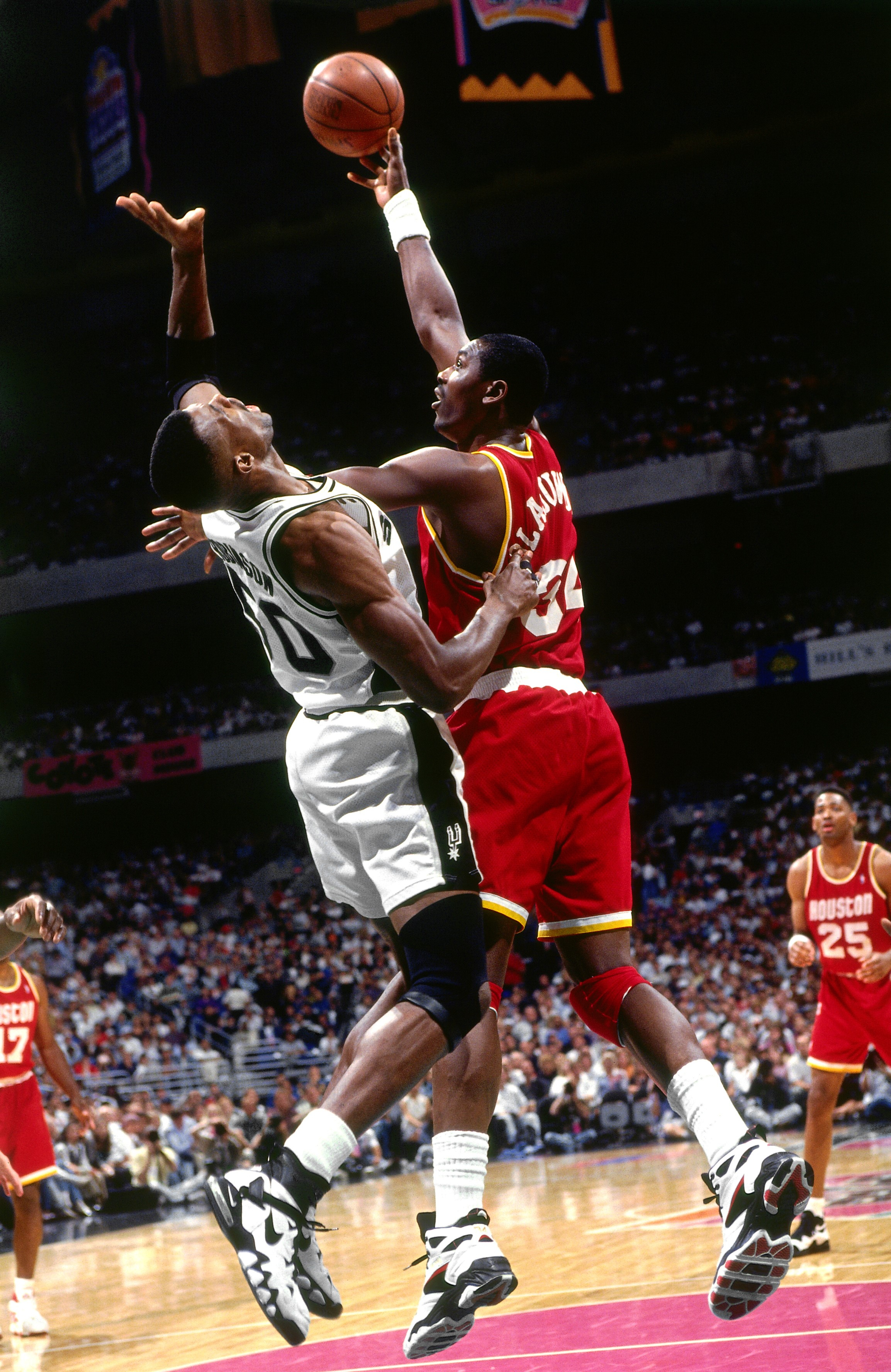
Hakeem Olajuwon (R) of the Houston Rockets shoots a sky hook over the head of David Robinson (L) of the San Antonio Spurs in Game 5 of the NBA Western Conference Finals at the Alamo Dome in San Antonio, Texas, May 29, 1995. /VCG
Hakeem Olajuwon (R) of the Houston Rockets shoots a sky hook over the head of David Robinson (L) of the San Antonio Spurs in Game 5 of the NBA Western Conference Finals at the Alamo Dome in San Antonio, Texas, May 29, 1995. /VCG
However, the first thing that comes to a non-Spurs-fan's when talking about Robinson is likely the 1995 NBA Western Conference Finals where he was brutally destroyed by Olajuwon. Moreover, some of the following words will probably accompany Robinson for a long time – soft, overrated, unqualified leader.
In fact, when he first joined the NBA, Robinson was more than impressive. The Spurs selected him with the first pick in the 1987 NBA Draft. As a seven-footer with a 107-kilogram-weight, he had even better athleticism than Olajuwon.
In his first year, Robinson averaged 24.3 points, 12 rebounds and 3.9 blocks per game, which put him in the All-Star Game, the All-NBA Third Team and the NBA All-Defensive Second Team. Thanks to his efforts, the Spurs added 35 wins to their season record (56-26).
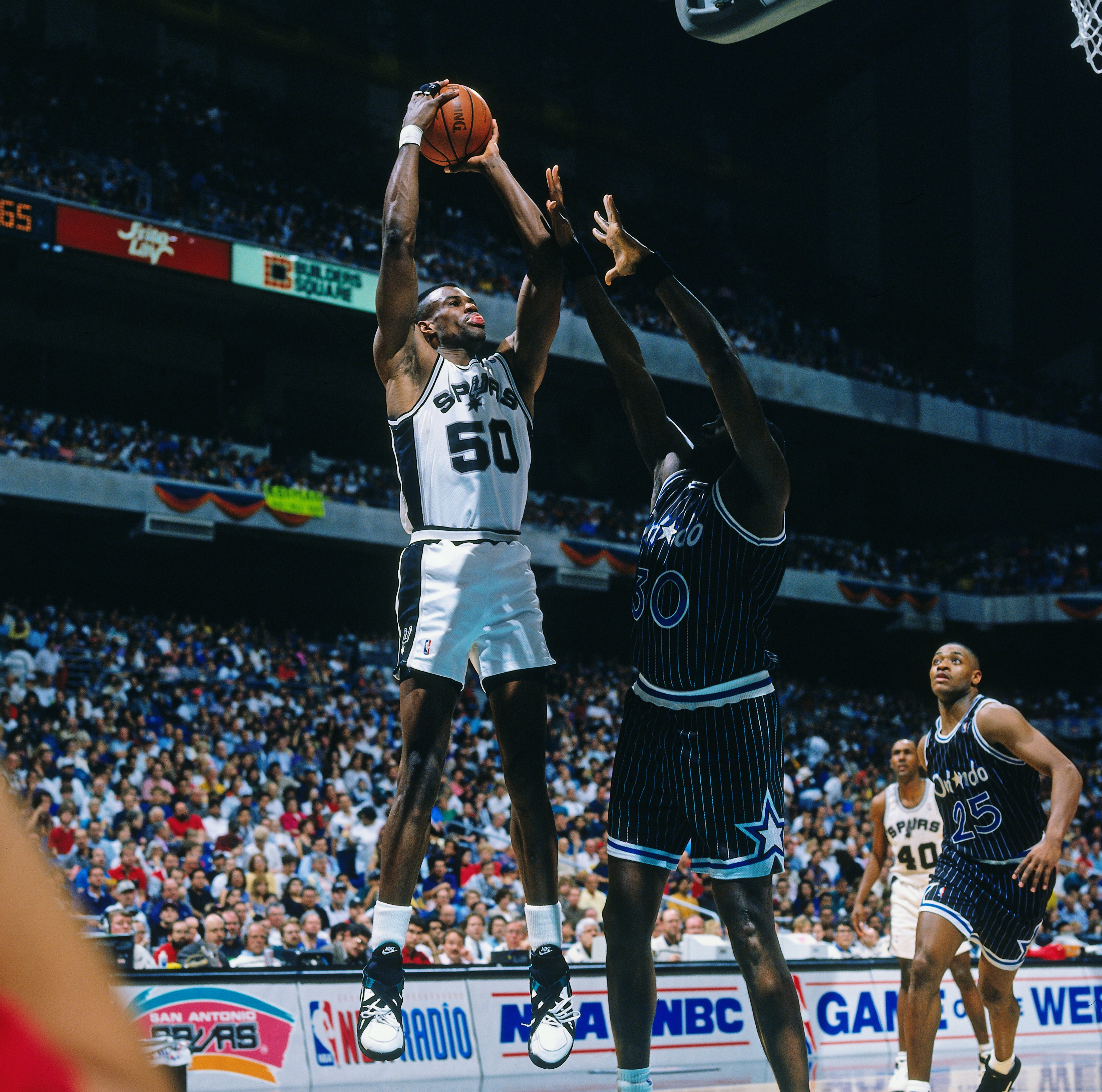
David Robinson 350 of the San Antonio Spurs shoots the ball in the game agaisnt the Orland Magic at the Alamodome, 1994. /VCG
David Robinson 350 of the San Antonio Spurs shoots the ball in the game agaisnt the Orland Magic at the Alamodome, 1994. /VCG
In the following years, Robinson continued to reap more honors under his name – rebounding champion in 1991 (13 rebounds per game), blocking leader (4.5 blocks per game) and Defensive Player of the Year (DPOY) in 1992, scoring champion in 1994 (29.8 points per game, including a 71-point performance), and the NBA Most Valuable Player (MVP) in 1995.
Pat Riley and Bill Simmons once praised Robinson as the next Bill Russell.
Moreover, Robinson is a true gentleman off the court. He's easy to approach; he studied engineering, mathematics; he played piano and saxophone; he never paid attention to cheerleaders and spent his time at home with his family instead of going to strip clubs. In his second year, Robinson was the only one in the league that people believed could match Michael Jordan in business values.
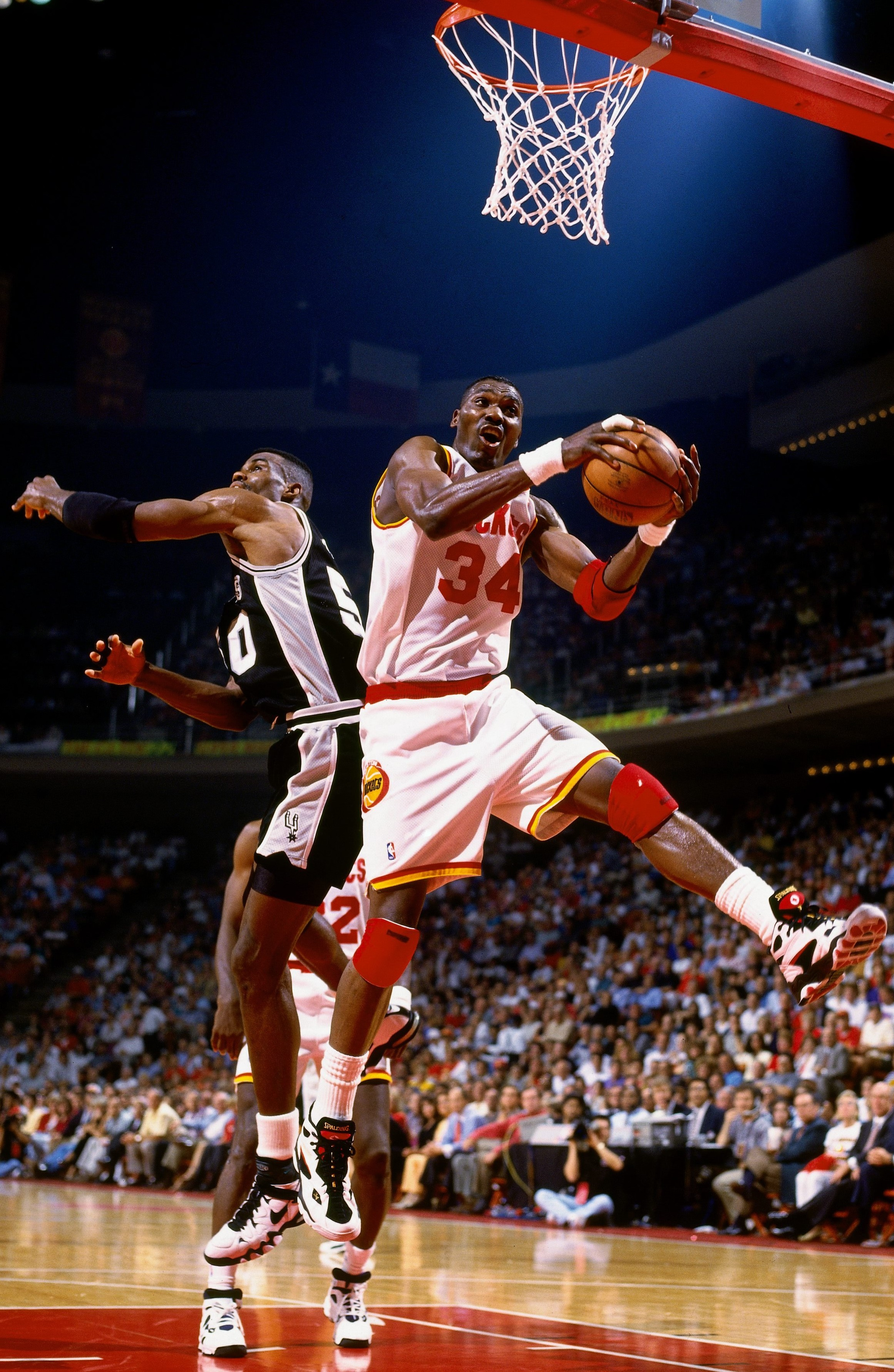
Hakeem Olajuwon #34 of the Houston Rockets grabs a rebound over David Robinson of the San Antonio Spurs in Game 6 of the NBA Western Conference Finals at The Summit in Houston, Texas, June 1, 1995. /VCG
Hakeem Olajuwon #34 of the Houston Rockets grabs a rebound over David Robinson of the San Antonio Spurs in Game 6 of the NBA Western Conference Finals at The Summit in Houston, Texas, June 1, 1995. /VCG
In March, 1995, Robinson led the Spurs to beat the Houston Rockets 124-103 in a regular-season game. He dropped 31 points, 11 rebounds, outplaying Olajuwon who got 25 points and six rebounds. This victory not only sealed the MVP award for Robinson, but also gave the press a good reason to call him "the best center in the league."
Few would disagree but Olajuwon must be one of them as he made it clear: You can never tell who is the best until a seven-game series is over.
We all know what happened later. The Rockets (47-35) knocked out the Spurs (62-20) in the Western Finals. Olajuwon gained perfect vengeance with 35 points, 13 rebounds, five assists and four rebounds per game. Though Robinson had 24+11+3+2, everyone who ever watched what happened on the court would agree that Olajuwon truly broke him. After that, Robinson was never compared with Olajuwon again. The photo, gif and clip of Olajuwon performing his signature "Dream Shake" became one of the most-played highlights in NBA history.
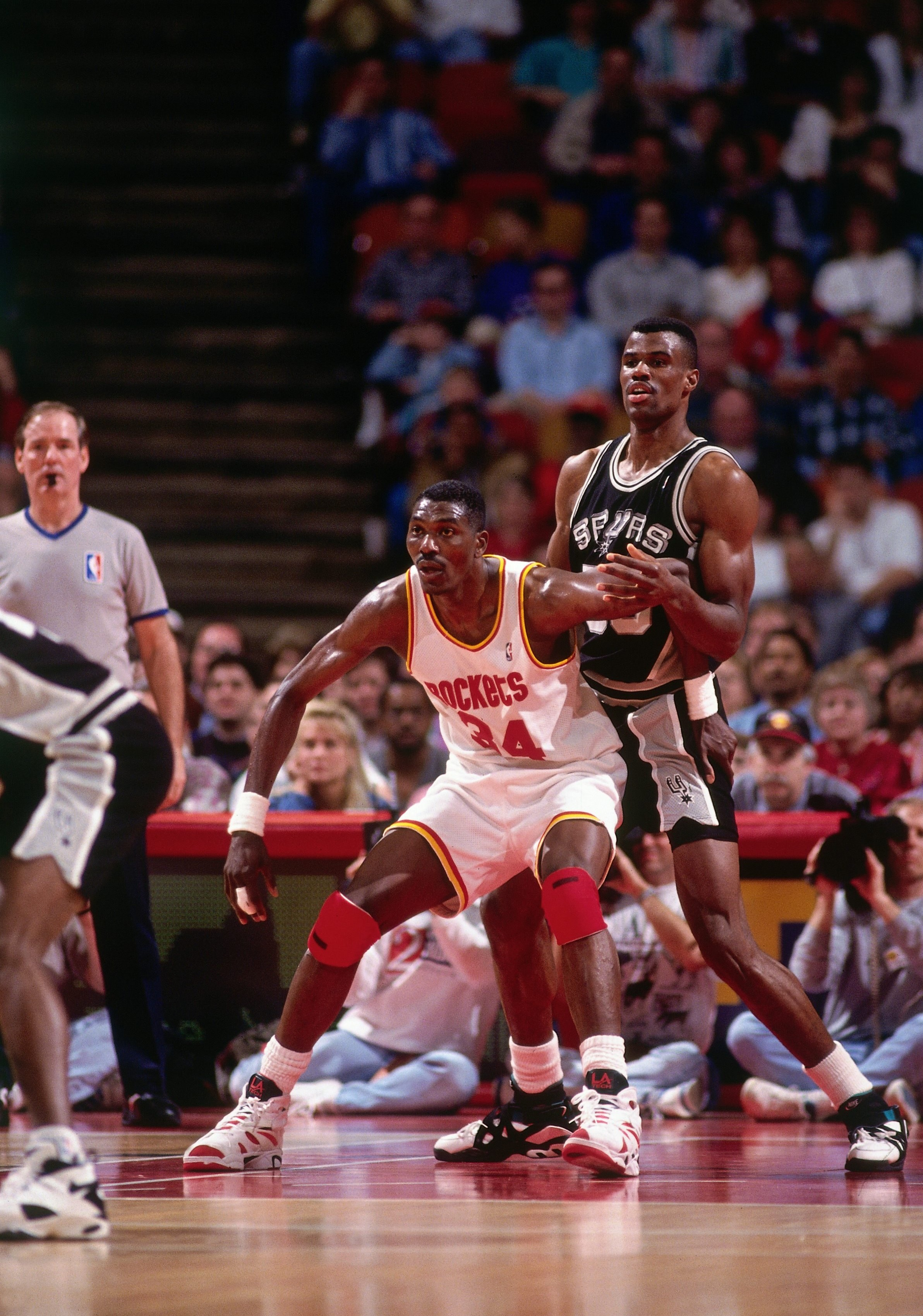
Hakeem Olajuwon #34 of the Houston Rockets tussles with David Robinson of the San Antonio Spurs in the NBA Western Conference Finals at The Summit, 1994. /VCG
Hakeem Olajuwon #34 of the Houston Rockets tussles with David Robinson of the San Antonio Spurs in the NBA Western Conference Finals at The Summit, 1994. /VCG
How did this happen?
There were two major reasons. From the point view of skills, Robinson had many merits – he is a good 15-to-20-foot shooter; his historic quickness and explosiveness made him a great rebounder and blocker; thanks to his speed, Robinson was both a remarkable big-man slasher and switch defender.
Nonetheless, what he lacked was a strong-enough lower body and that made him not solid enough in both offense and defense. As a result, Robinson relied too much on his touch in offense and was vulnerable from tussling in the paint in defense. By contrast, Olajuwon's power, post moves and toughness made him the natural enemy of Robinson.
By the way, to be fair, there was no shame losing to Olajuwon between 1994 and 1995 because no one could match him in those two years. Besides Robinson, he also beat Ewing and O'Neal in the NBA Finals of the two seasons to win the two championships of his.
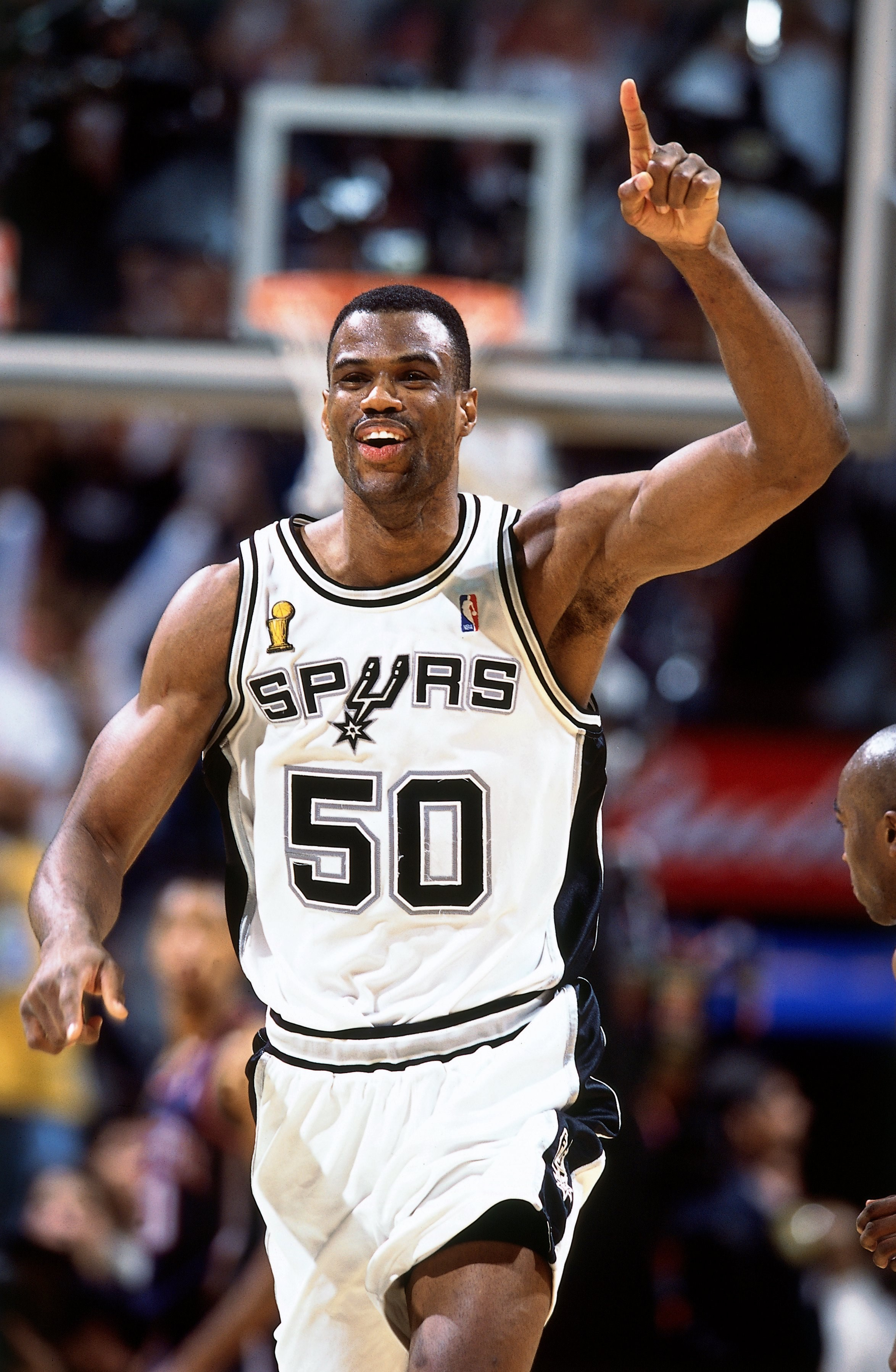
David Robinson of the San Antonio Spurs reacts in a game at the Alamodome, 2003. /VCG
David Robinson of the San Antonio Spurs reacts in a game at the Alamodome, 2003. /VCG
The other reason came from Robinson's personality.
"I don't understand what Michael's doing. Why did he come back? He has a beautiful wife and three kids. What's he trying to prove that he hasn't proved already? Is it that he's the best we've ever seen? We know that. It seems to me he's just chasing his own tail. Why isn't he enjoying this time with his family?"
The above was what Robinson said on Michael Jordan's return from baseball.
It all added up. Robinson is a true gentleman, a great teammate, a real nice guy, but none of that could help him win in the ruthless playoff stage. It takes aggressive, competitive lunatics like Jordan to win a title and Robinson has never been wired like that.
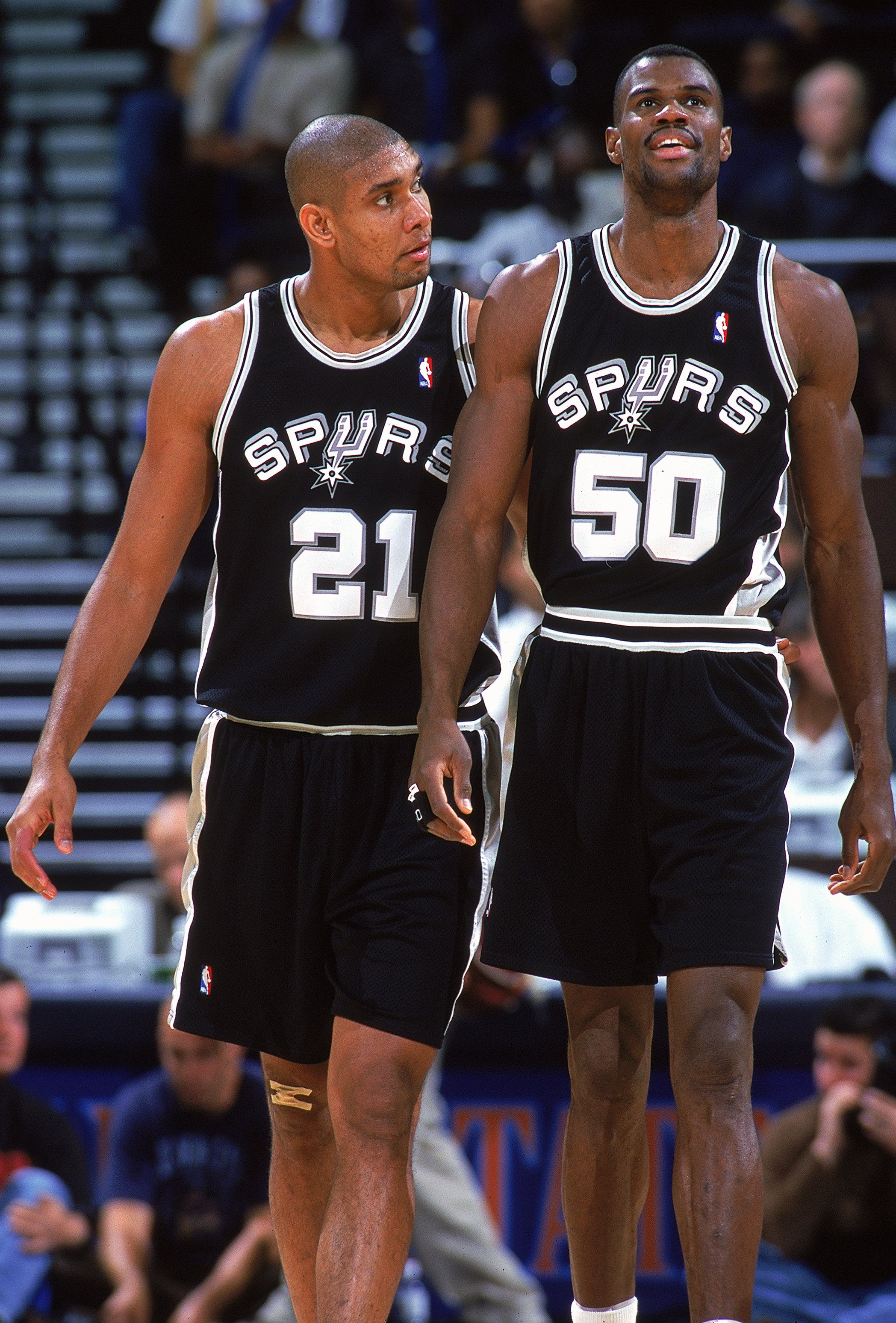
Tim Ducan #21 and David Robinson #50 of the San Antonio Spurs in the game against the Golden State Warriors at the Oakland Coliseum in Oakland, California, November 9, 1999. /VCG
Tim Ducan #21 and David Robinson #50 of the San Antonio Spurs in the game against the Golden State Warriors at the Oakland Coliseum in Oakland, California, November 9, 1999. /VCG
However, it was also such personality of Robinson that laid the foundation for the Spurs' success in the following years.
In the 1997-98 season, Robinson was still able to put down 21.6 points and 10.6 rebounds per game. Meanwhile, first-year rookie Tim Duncan averaged 21.1 points and 11.9 rebounds. In the 1998-99 season, Spurs head coach Gregg Popovich made Duncan the team's first offensive option and Robinson accepted it.
In the 1999 playoffs, Duncan scored 23.2 points, 11.5 rebounds, 2.8 assists and 2.6 blocks with 16.6 field goal attempts per game. Robinson reduced his attempts to 10.6 and watched his stats drop to 15.6+9.9+2.5+2.4. Nonetheless, the Spurs won their first NBA Championship in franchise history.
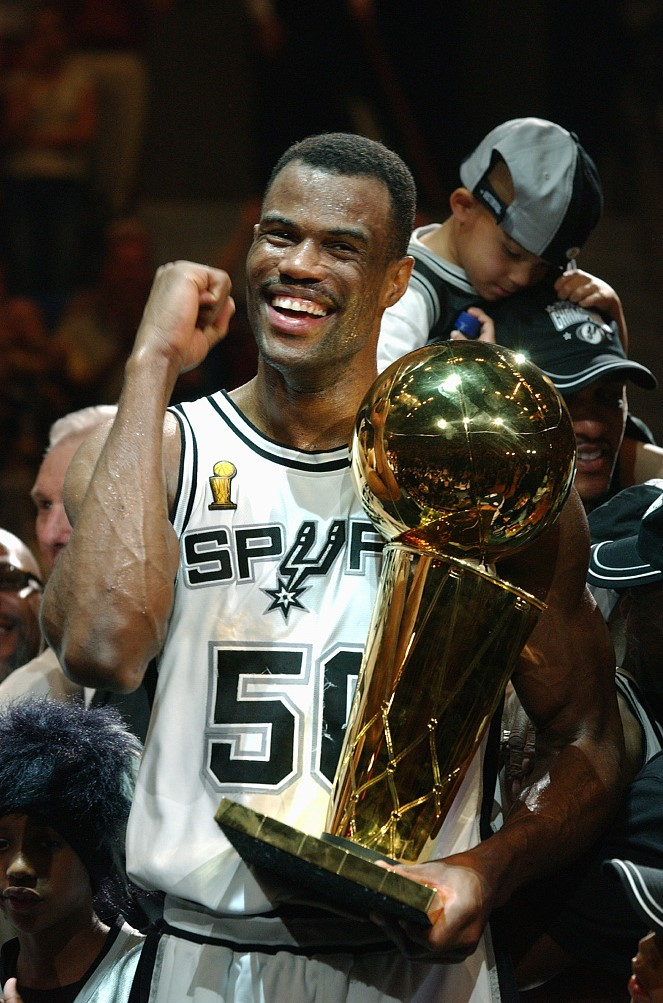
David Robinson of the San Antonio Spurs celebrates with the Larry O'Brien NBA Championship Trophy after Game 6 of the NBA Finals against the New Jersey Nets at the SBC Center in San Antonio, Texas, June 15, 2003. /VCG
David Robinson of the San Antonio Spurs celebrates with the Larry O'Brien NBA Championship Trophy after Game 6 of the NBA Finals against the New Jersey Nets at the SBC Center in San Antonio, Texas, June 15, 2003. /VCG
One of the 50 Greatest Players in NBA History, future Naismith Basketball Hall of Famer, former NBA MVP, was willing to play second-in-command for a second-year young man and he did it for five years until retirement in 2003.
In his best time, Robinson was overrated because of his physical talents and performance in the regular season. He could not be team's go-to-guy in the playoffs.
Nonetheless, he was also underrated for his contributions to the Spur's 20-year-long success. Robinson's modest and amiable gave Duncan an ideal start to lead the team. He might not be the star, but he did everything else the team needed him to do to win.